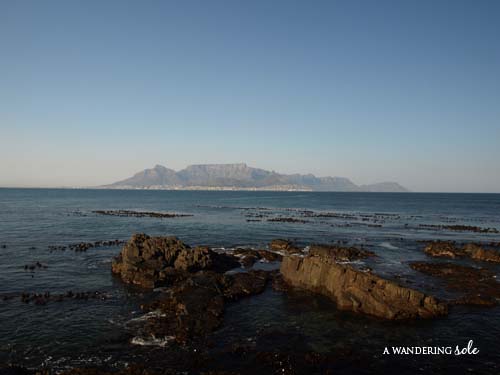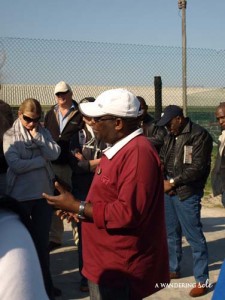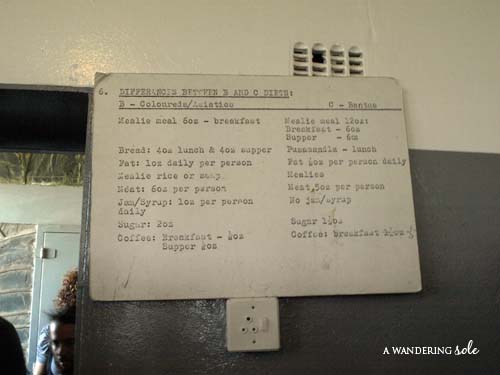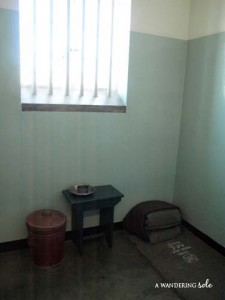“We want Robben Island to reflect the triumph of freedom and human dignity over oppression and humiliation.” -Ahmed Kathrada, Prisoner 468/64, Robben Island 1964-1982

Note: I feel this post is largely condensed, as there is so much to be learned about apartheid. However, I hope that it will spark an interest in a visit to the island and an interest to learn more about South Africa’s political history. I can’t possibly say everything I want to convey here, so I’ve decided to give a very broad overview of the tour.
Robben Island, just 12 kilometeres from Cape Town, is undoubtedly most famous for being the former prison of Nelson Mandela. However, the island has a long and varied history, being used as a prison, a place for outcasts, and even a training and defense station during World War II.

I had read varied reviews on the tour of Robben Island but they were running a ‘Winter Special’ and the 9am tour was half off. It made my decision easy, and I decided to go. A ferry departs from the waterfront three times per day for Robben Island. The tour lasts three hours, including a 30 minute ride to and from the island. We disembarked from the ferry and were escorted to large tour buses that would drive us around the island while a guide provided information. I was one of the many ignorant tourists in the group that, prior to the tour, would have referred to Robben Island as ‘that place where Nelson Mandela was imprisoned.’ But I soon learned that it had been a hospital for lepers and a prison for many centuries. Robben Island still has a village of people living there, including the guides and their families. We passed a school with six children sitting out front, and the guide said, “Well, there’s about half the school’s population right out front.” He wasn’t joking- the school only has 16 pupils.
The history behind Robben Island largely relies on the history of apartheid, and frankly, that could take ages and heaps of posts. Therefore, if you are not familiar with apartheid you may want to take a few minutes to research it. In a very brief and incomplete nutshell, apartheid was a system of racial segregation used in South Africa between 1948 and 1994. You fell into a category of either white, black, colored (mixed race), or Indian. Education, medical care, living areas, and many other things were separated. If you weren’t white, you were no longer a citizen, and therefore, were not allowed to own land either. Okay, although brief, I will leave it at that, but it really is a fascinating subject, and I encourage you to pick up a book on it.
In 1961, Robben Island became a prison for anti-apartheid political activists. No whites were imprisoned here during this time. After our bus tour around the island, we were dropped off at the prison to be taken through it by another guide. What I found fascinating is that all of the prison tour guides are former political prisoners. They have lived under cruel conditions in this prison, become stripped of their rights, and been dehumanized. And yet, they now live on the island and relive their imprisonment on a daily basis.

At the beginning of the tour, our guide gave us a brief introduction of himself. He was imprisoned for about 12 years on the island. A young man spoke up and asked, “Was it hard to come back here to be a guide?” While the answer was an obvious, ‘No duh,’ the guide simply stated, “Of course.” “So why did you come back then?” The guide stated the brutal truth: “It had been eight years, I was unemployed, and desperate for a job. I had to support my family. The day I was released from prison, the first thing I did was climb up Table Mountain in Cape Town, look back to the island, and swear that I would never step foot there again.” While it was unimaginably difficult, he did say that it has helped him come to terms with what happened. There are even former guards working alongside these former prisoners.

Our first stop on the tour was in the cafeteria. There are large signs posted, stating what type of food and how much each prisoner received. Coloreds were ranked above blacks, and therefore got more food. I believe my guide said that over 90% of inmates were black though, so most inmates got meager helpings.

We visited different blocks within the prison and our guide showed us his former bed. It was all very tough to hear and see, because 99% of the people that had lived in this harsh and cold environment didn’t deserve it. We saw Nelson Mandela’s cell, and the tour concluded in a most disturbing and eye-opening manner. In the last prison block that we entered, we were free to walk around in the cells. Each cell featured a photograph of a prisoner and a story that they had written. I read horrible accounts. Prison guards would place bets on which prisoner would be dragged out of their cell and killed next. A prisoner would go for a medical check-up and listen to the doctors discuss which organs could be salvaged, as if this patient weren’t even sitting there. If a prisoner’s mother died, he found out months later, and of course, he was never told how or why. It was very depressing, but also very real. It happened, and it’s something the world (and I) has to acknowledge.
There were moments that were inspiring. After all, good things can come from terrible situations. Nelson Mandela and many other inmates dug in a quarry for years. He would educate them as they dug. These political prisoners were isolated from the world, but were all together. You can only imagine what happens when you put bright minds together who have great ideas and the motivation to change their country.
The tour concluded, and we were rushed back to the ferry to make our 12 o’clock departure time. I thought it was very educational and a way to ‘face the facts’ so to speak by hearing stories relayed personally by a former inmate. Even though you spend two hours on the island, it felt rushed. With that said though, it’s definitely worth a visit if you’re in Cape Town.
Who could possibly say something negative about RI??? Guess what, I had the SAME tour guide!!! I was in tears the whole time I was there. I found it to be such an incredibly powerful experience.
Andi, I can’t believe it either but some people were completely indifferent about the tour. I found it to be really interesting though.
I can’t even imagine how difficult it must have been for the guide to return to that place. But I can also imagine it made him come to terms with what happened, process it and move on.
I agree. Memories like that never fade, but he’s had to face them head on and move on with his life. Very empowering message.
I agree too, about how difficult it must be for him too return , my name is Matias and i am from Argentina , it was not easy for me to know how to speak english , to travel there , but for what i know it was really difficult for them when the set them free from that island because they become a family in there , friends they had to leave a lot when they where free. sure it was not easy too return but also to leave